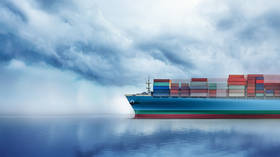Red Sea crisis worse for global supply chain than pandemic – maritime firm

The ongoing disruption to shipping in the Red Sea is more damaging to global supply chains than the impact of the Covid-19 pandemic, according to data from maritime advisory firm Sea-Intelligence.
Yemen-based Houthi rebels have carried out dozens of drone and missile attacks in the Red Sea since the beginning of the Israel-Hamas war in October. The militant group has vowed to continue until the conflict ends and the Israeli blockade of Gaza is lifted.
Sea-Intelligence analyzed current vessel delays compared to those over the last several years. Statistics issued on Thursday showed that the longer transit around the Cape of Good Hope in southern Africa as vessels divert from the Red Sea is already having a more significant impact on ships available to pick up containers at ports than during the Covid-19 period.
According to the report, the current vessel capacity drop is the second largest in recent years. The only single event with a bigger impact was the blocking of the Suez Canal by the Ever Given container ship for six days in March 2021. That incident left hundreds of vessels stuck in mooring and reportedly held up $9 billion of global trade for each day of the stoppage.
According to CNBC, Sea-Intelligence and other maritime organizations estimate that approximately 10% of the world’s fleet is currently not in service. “If additional vessels were deployed, it could correct the imbalance in vessel availability and increase certainty in vessel schedules,” the outlet wrote.
The increased risk of attack in the Red Sea has forced major shipping firms to avoid the Suez Canal, the fastest cargo route from Asia to Europe. The sea lane normally accounts for 15% of the world’s commercial shipping.
The US and UK launched a bombing campaign on Yemen last Thursday, with the stated goal of protecting maritime commerce in the Red Sea. Following the Western airstrikes, a Houthi spokesman announced that for a ship to be targeted, “it is enough for it to be American.” This week, the rebels claimed responsibility for an attack on the US-owned cargo vessel Genco Picardy.
For more stories on economy & finance visit RT's business section












